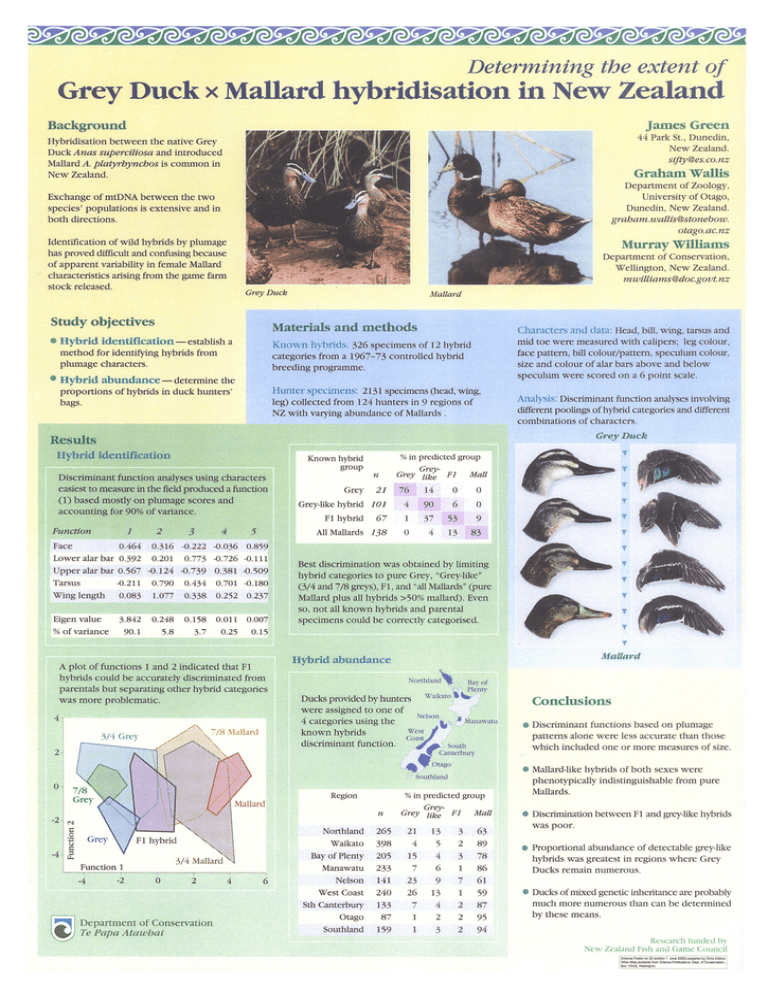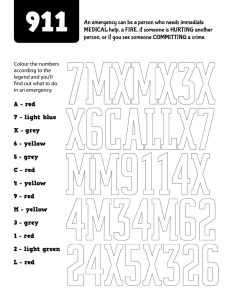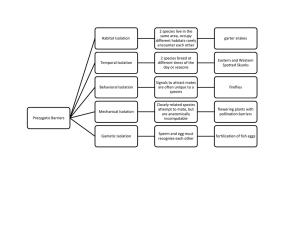Grey Duck x Mallard hybridisation in New Zealand
advertisement

Determining the ex tent of Grey Duck x Mallard hybridisation in New Ze aland Background James Green 44 Park St. , Dunedin , New Zealand. sifty@es.co.nz Hybridisation between the native Grey Duck Anas superciliosa and introduced Mallard A. platyrhynchos is common in New Zealand. Graham Wallis Department of Zoology, University of Otago, Dunedin, New Zealand. graham. wallis@stonebow. otago.ac.nz Exchange of mtDNA between the two species' populations is extensive and in both directions. Identification of wild hybrids by plumage has proved difficult and confusing because of apparent variability in female Mallard characteristics arising from the game farm stock released. Murray Williams Department of Conse rvat ion, Wellington, New Zealand . nuottuamsesdoc.goot.nz Grey Duck Study objectives Mallard Materials and methods • Hybrid identification - establish a method for identifying hybrids from plumage characters. Known hybrids: 326 specimens of 12 hybrid categories from a 1967-73 controlled hybrid breeding programme. Characters and data: Head , bill, wing, tarsus and mid toe were measured with calipers; leg colour, face pattern, bill colour/pattern, speculum colour, size and colour of alar bars above and below speculum were scored on a 6 point scale. Hunter specimens: 2131 specimens (head, wing, leg) collected from 124 hunters in 9 regions of NZ with varying abundance of Mallards. Analysis: Discriminant function analyses involving • Hybrid abundance - determine the proportions of hybrids in duck hunters' bags. different poolings of hybrid categories and different combinations of characters. Grey Duck Results Hybrid identification Discriminant function analyses using characters easiest to measure in the field produced a function (1) based mostly on plumage scores and accounting for 90% of variance. Function 1 2 3 4 5 Face Lower alar bar Upper alar bar Tarsus Wing length 0.464 0.316 -0.222 -0.036 0.859 0.392 0.201 0.773 -0.726 -0.111 0.567 -0.124 -0.739 0.381 -0.509 -0.211 0.790 0.434 0.701 -0.180 0.083 1.077 0.338 0.252 0.237 Eigen value % of variance 3.842 90.1 0.248 5.8 % in predicted group Known hybrid group 0.158 0.011 0.007 3.7 0.25 0.15 A plot of functions 1 and 2 indicated that Fl hybrids could be accurately discriminated from parentals but separating other hybrid categories was more problematic. 4 11 Grey Grey­ Grey like F1 Mall 21 76 14 0 0 Grey-like hybrid 101 4 90 6 0 F1 hybrid 67 1 37 53 9 All Mallards 138 0 4 13 83 Northland' Bar of Plenty . Waikato • "- % in predicted group n -4 GreyGrey like FJ Mall N &: Function 1 -4 liJ -2 o 2 Department of Conservation . " Te Papa Atatohai 4 6 ... ... ... , Ducks provided by hunters were assigned to one of .. Nelson . 4 categones usmg the " . Manawatu known hybrids wc~ .t Coast ~ ', Sout h discriminant function . Region e ... ... Mallard o ... ... Hybrid abundance !If Canterburv t _ ' o tago . J S;llIthland .S u c:: ... ... ... Best discrimination was obtained by limiting hybrid categories to pure Grey, "Grey-like " (3/4 and 7/8 greys), F1, and "all Mallards" (pure Mallard plus all hybrids >50% mallard). Even so, not all known hybrids and parental specimens could be correctly categorised. 2 -2 ... Northland Waikato Bay of Plenty Manawatu Nelson West Coast 5th Canterbury Otago Southland 265 398 205 233 141 240 133 87 159 21 4 15 7 23 26 7 1 1 13 5 4 6 9 13 4 2 3 3 2 3 1 7 1 2 2 2 63 89 78 86 61 59 87 95 94 Conclusions • Discriminant fun ctions based on plumage patterns alone were less accurate th an those which included one or more measures of size . • Mallard-like hybrids of both sexes were phenotypically indi stinguishable from pure Mallards. • Discrimination between Fl and grey-like hybrids was poor. • Proportional abundance of detectable grey-like hybrids was greatest in regions where Grey Ducks remain numerous. • Ducks of mixed gen etic inheritanc e are probably much more numerous than can be determined by these means. j Research funded h\ le w Zealand Fish and Game Council .u. Sc::tIra~ ... no 32(eclIlIon t 2000) rnp.ll..cl by QIn, EI»'lI CllhefIDM...,.lItl6IfrurnSdence~ .OIIJld~, 80Il 1(10120. w.IngIon.


